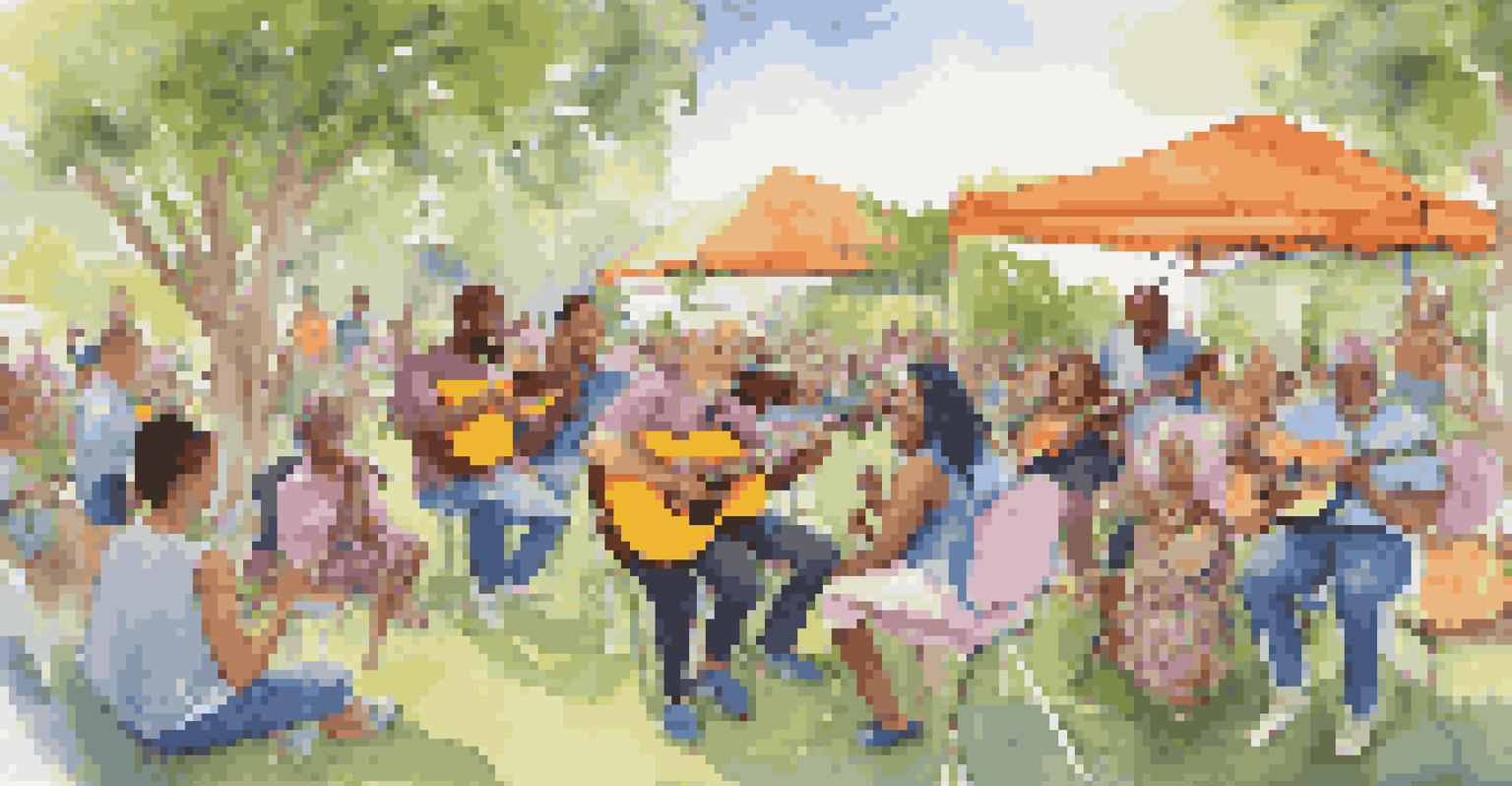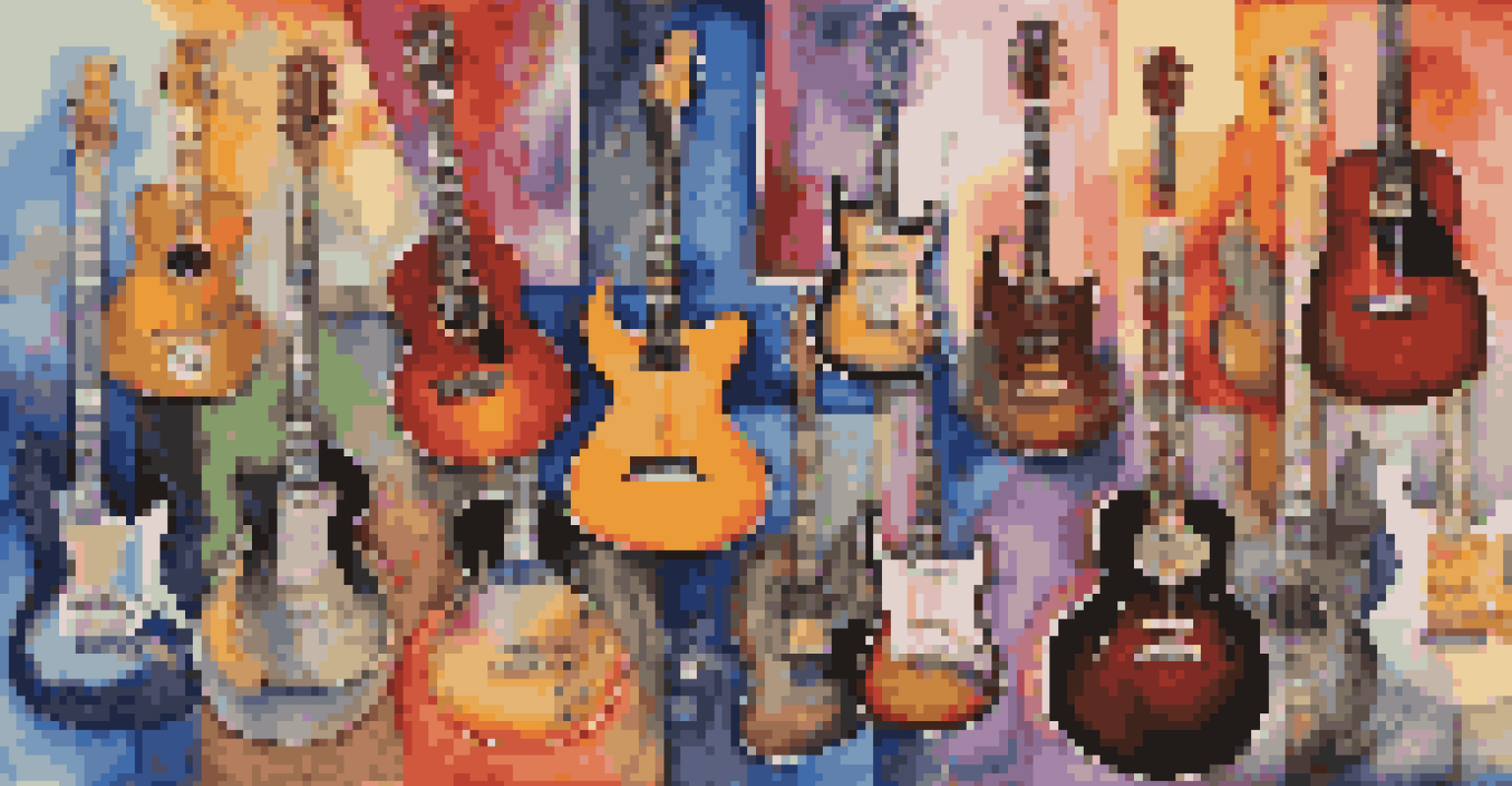The Role of Music in Identity Crisis and Recovery

Understanding Identity Crisis Through Music
An identity crisis can be a tumultuous experience, often leaving individuals feeling lost or disconnected. Music plays a significant role during these times, serving as a mirror reflecting our inner emotions and struggles. For many, songs become the soundtrack to their life stories, resonating with their feelings of confusion or longing.
Music can change the world because it can change people.
When people face identity challenges, they often turn to music that resonates with their current emotional state. Whether it's a ballad about heartbreak or an anthem of empowerment, these melodies can help articulate feelings that might otherwise remain unexpressed. This connection to music can provide solace, allowing individuals to feel understood and less isolated.
Moreover, the lyrics and themes of certain songs can guide listeners through their crises, offering a sense of clarity or direction. For instance, an uplifting song can inspire hope, while a reflective piece might encourage introspection. In this way, music serves not just as an escape, but as a companion in navigating the complexities of identity.
The Therapeutic Power of Music in Recovery
Music therapy has emerged as a powerful tool in the realm of mental health and recovery. This form of therapy harnesses the emotional resonance of music to help individuals process their experiences and feelings. By engaging with music, patients can explore their identities in a safe and supportive environment.

During recovery, music can evoke memories and emotions that facilitate healing. For example, creating playlists of favorite songs can help individuals reconnect with positive memories or foster feelings of empowerment. This process not only aids in emotional release but also encourages a sense of agency over one's recovery journey.
Music as a Mirror of Identity
Music reflects our emotions and experiences during identity crises, helping individuals articulate their feelings and connect with their struggles.
Additionally, group music sessions can foster community and support, making individuals feel less alone in their struggles. Sharing music with others creates a bond that can be incredibly healing, reminding participants that their experiences are valid and shared. This communal aspect of music can play a crucial role in rebuilding one's identity.
How Music Shapes Self-Expression During Crisis
During an identity crisis, self-expression often becomes a challenge, and music can bridge that gap. Many individuals find that writing lyrics or composing melodies allows them to articulate feelings they struggle to express verbally. This creative outlet can be both liberating and therapeutic, enabling people to explore their inner selves.
Where words fail, music speaks.
For instance, a teenager grappling with their identity might write a song that reflects their feelings of confusion and hope. This act of creation not only provides an emotional release but also serves as a form of self-discovery. As they navigate their thoughts and feelings through music, they can gain insights into their true selves and desires.
Furthermore, the act of performing music, whether in a small group or on stage, can empower individuals to embrace their identities. Sharing one’s creations with others can foster a sense of pride and validation, which is essential during times of uncertainty. This cycle of expression and validation reinforces the journey toward self-acceptance.
Music's Role in Building Community During Recovery
The journey of recovery is often less daunting when shared with others, and music plays a pivotal role in fostering community. Group music activities, like jam sessions or choir practices, can create a sense of belonging among individuals facing similar challenges. This shared experience can significantly enhance the recovery process, making it feel less isolating.
Participating in community music initiatives can help individuals forge new relationships, offering support and encouragement. These bonds can become a vital part of the recovery journey, as individuals lean on each other for strength. Music not only connects people but also helps them find common ground in their struggles.
Community Through Shared Music
Participating in group music activities fosters a sense of belonging and support, making the recovery journey feel less isolating.
Moreover, community music projects can promote healing on a larger scale, bringing together diverse groups to celebrate shared experiences. By collaborating in musical endeavors, individuals contribute to a collective narrative of resilience and recovery. This sense of unity can reinforce a positive identity, transforming the experience of crisis into one of growth and connection.
Finding Personal Identity Through Music Genres
The music we choose to listen to often reflects our identities and can influence how we perceive ourselves. Different genres resonate with different aspects of our personalities, allowing us to explore various facets of our identity. For example, someone drawn to punk rock might find empowerment in its rebellious spirit, while a lover of classical music might connect with themes of elegance and introspection.
As individuals navigate their identity crises, experimenting with various music genres can be a form of exploration. By immersing themselves in different styles, they can uncover new interests and aspects of themselves that they may not have recognized before. This exploration can lead to a richer, multifaceted identity.
Additionally, identifying with a particular genre can create a sense of belonging within that musical community. Fans often share similar experiences or values, which can provide a comforting framework during uncertain times. Thus, music genres become more than just sounds; they serve as tools for self-discovery and connection.
The Impact of Lyrics on Personal Reflection
Lyrics often hold profound meanings that resonate deeply with listeners, especially during times of crisis. Artists articulate their struggles and triumphs, providing a voice for those who may feel voiceless. By listening to these narratives, individuals can find parallels in their own lives, prompting introspection and reflection.
For example, a song addressing themes of loss and recovery can encourage listeners to confront their own experiences with grief. The relatability of the lyrics can foster a sense of validation, reminding individuals that they are not alone in their journey. This connection can be the catalyst for personal growth and healing.
Genres Reflect Personal Identity
Exploring different music genres allows individuals to discover new facets of themselves, aiding in their journey of self-exploration and identity formation.
Moreover, analyzing song lyrics can lead to meaningful conversations about identity and recovery. Whether discussing a song with friends or writing about it in a journal, this process allows individuals to articulate their feelings and thoughts. This reflective practice can be instrumental in navigating the complexities of identity crises.
The Future of Music in Identity and Recovery
As our understanding of mental health continues to evolve, so does the role of music in identity and recovery. With advancements in technology, we can now access a diverse range of music and resources, enhancing the therapeutic potential of music. This accessibility allows individuals to find the right soundtrack for their personal journey.
The rise of digital platforms has also fostered a global music community, where people can share their experiences and healing through music. Online workshops and virtual jams enable individuals to connect with others worldwide, broadening their support networks. This interconnectedness can be particularly beneficial for those facing identity crises.

Looking ahead, the integration of music therapy into conventional mental health practices is likely to grow. As more professionals recognize the profound impact of music on well-being, we can expect to see innovative approaches to using music as a means of recovery. The future holds exciting possibilities for music’s role in helping individuals reclaim their identities and heal from their struggles.